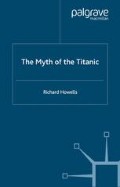Abstract
It is time now to add the third dimension to the late Edwardian construct of ideal behaviour as revealed in the myth of the Titanic: the dimension of race. Our examination of the popular texts has already revealed that nearly all the stories of individuals acting in an heroic manner involve males who are also members of the upper-middle or upper classes. It will now appear that the ideal hero was also white and Anglo-Saxon. Even when the people involved in ‘heroic’ behaviour did not in fact belong to these gender, class or racial groups, their behaviour is nevertheless described as if they had, for to die ‘like a man’ was also to die like an English-speaking gentleman. The fact that the majority of passengers on board the Titanic were not British only adds to the mythical power of historical reanimation at work.
Access this chapter
Tax calculation will be finalised at checkout
Purchases are for personal use only
Preview
Unable to display preview. Download preview PDF.
Notes
Robert Donnelly, ‘The Band Was Playing as the Ship Went Down’ (sheet music) (London, not dated, but almost certainly 1912).
Joseph, Conrad ‘Some Reflections, Seamanlike and Otherwise, on the Loss of the Titanic’ in The English Review, Volume XI, May 1912, pp. 304–15, p. 308.
Joseph Conrad, ‘Some Aspects of the Admirable Inquiry’ in the English Review, Volume XI, July 1912, pp. 581–95, p. 595.
Conrad ‘Some Aspects …’ (1912), p. 595. A literary analysis of Conrad’s Titanic articles can be found in J.H. Stape, ‘Conrad Controversial: Ideology and Rhetoric in the Essays on the Titanic’ in Prose Studies, volume 11, no. 1 (1988), pp. 61–8. Stape explains that Conrad lost the manuscript of his short story ‘Karain’ on the Titanic (p. 61). The thrust of Stape’s argument, however, is to reveal Conrad’s ‘nuanced stylistic performance’ (p. 61).
George Bernard Shaw, ‘Some Unmentioned Morals’, letter to the Daily News and Leader, 14 May 1912, p. 9.
Shaw, letter to the Daily News and Leader (22 May 1912), p. 9.
Gregory Nagy, The Best of the Achaeans (Baltimore, 1979), pp. 16–17.
Homer, The Iliad, translated by Richard Lattimore (Chicago, 1951), p. 209.
Author information
Authors and Affiliations
Copyright information
© 1999 Richard Howells
About this chapter
Cite this chapter
Howells, R. (1999). ‘Be British!’. In: The Myth of the Titanic. Palgrave Macmillan, London. https://doi.org/10.1057/9780230510845_6
Download citation
DOI: https://doi.org/10.1057/9780230510845_6
Publisher Name: Palgrave Macmillan, London
Print ISBN: 978-1-349-40585-5
Online ISBN: 978-0-230-51084-5
eBook Packages: Palgrave Social & Cultural Studies CollectionSocial Sciences (R0)

